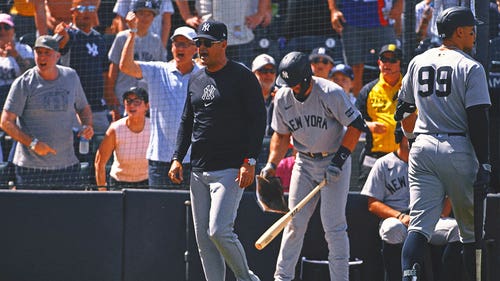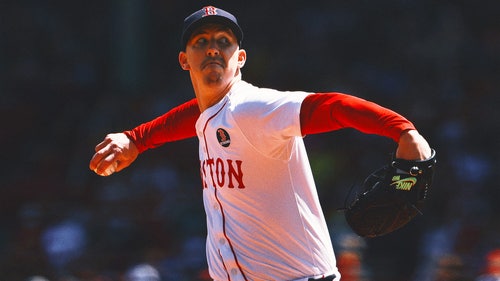
Whiparound: Please don't take away our glorious intentional walks
Editor's note: The MLB Whiparound column takes the spirit of FS1's studio show and brings it to your Internet screen. Each week, FOX MLB analyst C.J. Nitkowski will go around the league to give you his thoughts on some of baseball's biggest topics.
A report is floating around that Major League Baseball is considering abolishing the four-pitch intentional walk. Instead of a pitcher throwing four balls away from a hitter, with the catcher standing with his arm out calling for the IBB, the new proposed rule will allow a team to just signal to the umpire that it is electing to walk that hitter, and he would then stroll to first without any pitches thrown.
At the center of this is improved pace of play, something that is always on the mind of Commissioner Rob Manfred. While pace of play is important, how long does it take to intentionally walk a hitter? 50-60 seconds? Do we not have that kind of time? In 2015 teams issued 951 total intentional walks, or 0.4 per game, the lowest total since 1998 when MLB expanded to 30 teams.
I love the proactive approach of our commissioner, but this is silly. If the traditional intentional walk goes away this is what we would miss:
1. The chance of a pitcher throwing a ball away. It happens.
2. Taking a pitcher out of his rhythm by forcing him to throw four pitches intentionally out of the strike zone, which are usually at about 75 percent effort.
3. Giving the home team a chance to steadily rain boos on a visiting pitcher the entire time he is intentionally walking a hitter.
4. And maybe most importantly this and this:
This is taking it too far. The game will not be a better watch on TV if we take away the intentional walk. Plus, we have to keep alive the possibility of Miggy ever happening again.
In the wake of the Texas-Toronto brawl and subsequent disciplinary actions, I started thinking about penalties for intentional hard slides. The Blue Jays' Jose Bautista without question intentionally violated Rule 6.01 (j) 7.14 (1) when he started his slide late in an attempt to make aggressive contact with the Rangers' Rougned Odor. He admitted as much after the game.
With the neighborhood play no longer allowed, middle infielders must touch the base on all double plays. The new slide rules protect these fielders more than ever before, and because of that there is a new comfort level for them around the base and not that feeling of "I better get out of here before I get crushed."

So when a player slides late, like Bautista did, a middle infielder will be at risk for injury in a way he never has been before. And as in the case of Odor, he may take great exception to the runner's actions.
Perhaps Major League Baseball should give umpires the right to judge intent and give them the option to eject any player immediately if in their opinion that player intentionally broke a slide rule. I generally don't approve of giving umpires the right to judge intent, but in the case of Jose Bautista it seemed pretty clear, and any umpire could see that.
I had an interesting conversation with two big-league managers recently who both told me now, more than ever, they have to hold individual meetings with players. One-on-one meetings are nothing new to the game, but the frequency and reasons behind them caught my attention.
"Players crave feeling valued and need reassurance," one told me. Full explanations are now needed whenever a player is given a day off or is dropped in the lineup. An 0-for-15 slump or a .230 batting average is not enough for some players to realize why they are sitting or getting moved down. Many of them need it explained to them. This is new to baseball.
Generations change, and I believe it's the job of leadership to adjust with their workforce in order to get the best out of them. With that being said, self-evaluation is a good trait to have, and when you're not going well you should probably be prepared for a change in role or some time on the bench. It would also be good if a coach or manager didn't have to spend the time explaining why every move was made. In this game when you're bad, your playing time will reflect that.

For a lot of major leaguers the first failure they've every experienced comes on this big stage. Some don't handle it as well as others and need to be coaxed through those rough times more than ever before.
The story that circulated about Fredi Gonzalez receiving his flight confirmation back to Atlanta via email before he was told he was fired was actually true. I talked to Fredi, my former bench coach in Atlanta in 2004, on the radio last week. There was an opportunity to complain about the mistreatment by the team he managed for six seasons. Instead, he took the high road.
No one likes to be fired and certainly no one ever wants to find out that they've been fired before your boss actually tells you. Fredi said he considers Braves president John Hart a friend and was able to look past the obvious oversight by the Braves. A lesser man may have taken the opportunity to bury his former employer. Fredi Gonzalez is a class act. He also talked about his desire to learn the game from a new angle and may pursue an opportunity in a front office, should one present itself.
The St. Louis Cardinals entered play Saturday leading baseball in errors committed, a very un-Cardinals-like characteristic. There is a conflict though: the Cardinals were also fourth in baseball in Defensive Runs Saved (DRS).
So what does that tell us about the Cardinals defense?
Manager Mike Matheny told me the advanced metrics (DRS & others) tell him that things will get better. He likes the range he has seen from his team and said that sometimes having more range leads to more errors. That's true. But errors lead to longer innings, more pitches thrown, more pitching changes and most importantly, more runs.
I love the idea of a defensive advanced metric that tells us an accurate story, but they just fall flat in giving us much in the way of reliable information. The way the data is acquired, by watching games on TV, offers little in the way of accuracy. The concept is great, but defensive metrics are just not there yet.
Errors are real, and they are bad for a team. Those Cardinals errors have led to the second most unearned runs allowed in baseball. So if someone was to ask you about the team with the fourth best DRS in baseball, you would have to tell them that team has been one of the worst defensively in the game so far this season.

MLB Whip Around -- The Show, airs weeknights on FS1.






